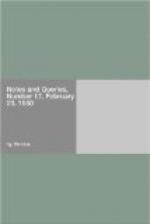Basse, whose rich mine of wit we
here behold
As porcelain earth, more precious, ’cause
more old;
Who, like an aged oak, so long hath stood,
And art religion now as well as food:
Though thy grey Muse grew up with elder times,
And our deceased grandsires lisp’d thy rhymes;
Yet we can sing thee too, and make the lays
Which deck thy brow look fresher with thy praise.
* * * * *
Though these, your happy births, have silent past
More years than some abortive wits shall last;
He still writes new, who once so well hath sung:
That Muse can ne’er be old, which ne’er
was young.”
These verses are valuable as showing that Basse was living in 1651, and that he was then an aged man. The Emanuelian of the same name, who took his M.A. degree in 1636, might possibly be his son. At any rate, the latter was a poet. There are some of his pieces among the MSS. in the Public Library, Cambridge; and I have a small MS. volume of his rhymes, scarcely soaring above mediocrity, which was presented to me by an ancient family residing in Suffolk.
A poem by William Basse is inserted in the Annalia Dubrensia, 1636, in praise of Robert Dover and his revival of the Cotswold Games; but it is not clear to which of these poets we may ascribe it. Malone attributes two rare volumes to one or other of these poets. The first, a translation or paraphrase of Juvenal’s tenth satire, entitled That which seems Best is Worst, 12mo., 1617; the second, “A Miscellany of Merriment,” entitled A Helpe to Discourse, 2nd edit. 8vo., 1620: but the former is more probably the work of William Barkstead. I may mention that a copy of Basse’s Sword and Buckler, or Serving Man’s Defence, 1602, is among Malone’s books in the Bodleian.




